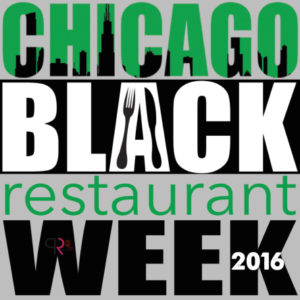
Chicago Black Restaurant Week – February 7-13, 2016
A report by Nielsen estimates that Black buying power will reach $1.3 trillion in the next few years, yet only a tiny fraction of that money is spent at Black-owned businesses.
Unhappy with the statistics, Chicago resident Maggie Anderson, along with her husband and two daughters, patronized Black-owned businesses for one year. She wrote about their journey in her 2012 book, Our Black Year, and it was the subject of several TED talks about how to increase wealth in the Black community.
Anderson shared her thoughts on the lack of Black businesses in Chicago with The New York Times.
“It was heartbreaking taking in how the West Side and the South Side used to have so many business owners, and now most of those businesses are owned by outsiders,” said Anderson.
She also mentioned that Black-owned businesses employed high percentages of Black people, multiplying the benefits of buying from them.
“If we want to create jobs in the Black community, we have to support Black businesses,” Anderson told The Times.
For African-American communities, Black support for Black-owned businesses is critical to their survival, said Veranda Dickens, chairwoman of the Chicago-based Seaway Bank. Seaway, founded in 1965, is now the third-largest Black-owned bank in the country, behind Liberty Bank & Trust and One United Bank.
“The mission is still as important today as it was 50 years ago,” Dickens told The New York Times.
In an effort to help further expose Black-owned businesses, Lauran Smith created the first Chicago Black Restaurant Week. The CEO & owner of PRbyELLE77 created the project to build a platform for Black-owned restaurants in the Chicago area.
It was started after she learned that a very popular restaurant in Chicago was Black-owned.
“I chose the week because before there was Black History Month, way back in 1926 Dr. Carter G. Woodson created Negro History Week, which was always the second week in February,” she said in an interview with Chicago’s WBEZ. “So I said, let me honor his initial vision to honor African-Americans who have played a part in our history. And let me do the restaurant week so it can commemorate what he did and so we can start something new in 2016.”
BeanSoupTimes.com publisher Toure Muhammad compiled a list of 123 Black-owned restaurants in the Chicago area on his site.
“There’s a realization in the community that the more we support Black-owned businesses the more jobs are created and kept in the community. It’s similar to the shop local movement,” he told WBEZ.
The number of Black-owned restaurants participating in Chicago’s Black Restaurant Week is very small, mainly because many Black-owned restaurants don’t know about it.
Smith invited a dozen Chicago area Black-owned restaurants and bakeries to discount some of their top dishes for the week.
The list of restaurants includes a bunch of places that are, unfortunately, off of the radar. According to Chicago Eater, so far 15 restaurants have committed to Chicago Black Restaurant Week. These establishments aren’t offering prix fixe menus like the original Chicago Restaurant Week. Instead they are offering discounted specials on individual items.
Peyton Willborn, African-American owner of Truth Italian in Chicago, will feature discounted versions of her wings, chicken Alfredo and Atlantic salmon.
“People need to know that we offer great food, that Black people can cook,” she told WBEZ. “We’re a small fish in a big sea, and people need to know we’re here. So I love the fact that we are having our first Black Restaurant Week.”
Chicago Black Restaurant Week is February 7-13, 2016.


